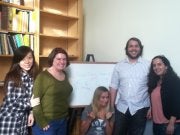Tackling tough questions about politics, technology, and media
Tackling tough questions about politics, technology, and media
From identifying the impact of Facebook’s ever-changing privacy controls to analyzing the political effects of economic depression on residents of Flint, Michigan, students in Dr. Diana Owen’s spring 2012 CCT thesis colloquium asked tough questions about the effects of new media technologies and recent political events on community and government. Self-dubbed the “Happy Thesis Students” group (denoting their perpetual state of happiness despite the sometimes challenging process of writing a thesis), these six students worked together to build original and sophisticated research projects that will potentially have an impact in their fields.

The “Happy Thesis Students” Hard At Work
Dr. Diana Owen, Associate Professor at CCT, advises projects that are at the crossroads of new media, politics, elections, and other forms of social organization. She is excited for the opportunity each year to work with each new group of thesis students. “The thesis process allows students to explore research questions deeply that they have developed over the course of their CCT experience. This year’s group was not afraid to tackle tough issues at the cutting edge of communications research. They examined questions that defy easy answers, and developed new methodologies for research on technological innovations. They were innovators and risk-takers—and it paid off with work that has pushed forward the boundaries of scholarship. It was a pleasure to work with this happy group, and they should be proud of what they have accomplished.”
Each student works independently on his or her thesis project, but there is a friendly and supportive community at CCT, making it a group effort. Many faculty members at CCT can serve as thesis advisors, allowing students to focus on a diverse body of research topics. Dr. Owen’s thesis group meets weekly to discuss methodology, work out theoretical questions, or generally be there for one another in support.
A bit about the thesis projects in Dr. Owen’s spring 2012 colloquium
Nancy Alamy researched how political attitudes are affected amidst long-term economic decline. Flint, Michigan has suffered under a prolonged economic recession and thus made for an especially intriguing focus in her study.
Zhijuan Fu studied the practices of Christian evangelical groups for Chinese students in the United States. Using both qualitative and quantitative methods, she identified the various practices of outreach used by these groups and the effects they have on Chinese students who are in the States for only a year or two.
Shelby Hodgkins looked at the effects that the length of presidential campaigns have on people’s attention and interests in politics. Using multiple methods, she found that the length of campaigns is negatively related to someone’s interest in politics and their electoral participation.
David Krone evaluated Facebook privacy settings for their ability to support users’ privacy decision. To conduct these evaluations, David administered a behavioral survey of Facebook users to determine the usability of these privacy settings and conflicts between users’ setting selections and their privacy preferences. David discovered that, although usability had a small impact on privacy conflicts, the visibility of settings such as “inline” profile controls strongly contributed to better user privacy.
Jeremy Riel explored the influence that digital literacy skills have on civic and political participation. He argued that digital literacy is a growing required skill set for public participation and conducted a nationally representative survey (n=1200) to measure technology skills and participation behavior.
Jennifer Young studied the practices of political conversations on Facebook. She collected data on the Facebook timelines of 25 participants and analyzed that data to understand the interactions and Facebook feature use that occur on political and social posts.
Each of the students above completed their thesis in late April, 2012.
About the CCT thesis process:
When planning their graduation route, CCT students have the option of completing their master’s degree through additional coursework or by proposing and completing an original thesis project. CCT thesis students engage in a four to eight-month project while working directly with a faculty advisor to develop and formally present their thesis to a group before graduation.
Upon completion of the project, students contribute to their fields of interest and often expand and revise their thesis projects to be conference presentations, publishable journal articles, and sometimes even books. Many CCT thesis projects continue to be used by the academic community. Projects have also helped students focus their career interests, preparing them for future work or doctoral study.
Students must propose a well-researched thesis question the semester before they can write the thesis. A committee of faculty members review thesis proposals and approve projects that are ready to proceed. Students should consult with a faculty member who they would like to serve as their thesis advisor while developing the thesis proposal.